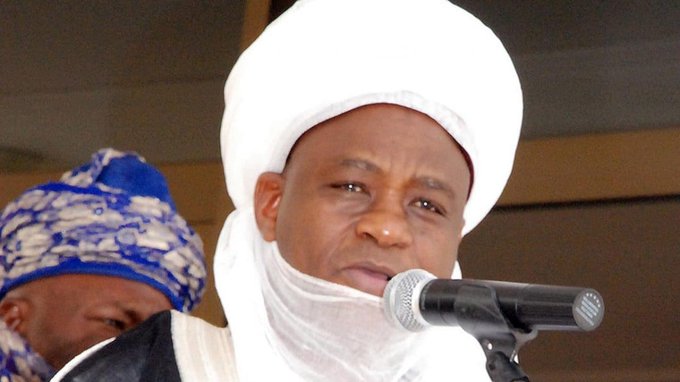Last week, while the eyes of the world were on Afghanistan, a fellow in one of Nigeria’s most tradition-bound states attempted the royal equivalent of a military coup.
The leader of the Shua Arab in Edo, Idris Adanno, in a curious, latter-day rediscovery of his linguistic and cultural identity, arranged for his own coronation as the “Sultan” of the Shua Arab in Edo. It was a sign of displeasure, if not rebellion, against the current practice of lumping together all leaders of Hausa communities as “Sarkin.”
When the epistemology of northern traditional institutions would be written, however, it will be recorded that while Sanusi Lamido Sanusi II, the deposed emir of Kano, thought it more profound and reverential to be called and addressed simply as “Sarkin Kano”, a certain Adanno thought the title had become too debased and common that he needed a higher, more exclusive order of preferment. He wanted to be called sultan instead.
Meanwhile, at about the same time, Adanno’s distant cousins in Warri, in an extraordinary display of villainous audacity, stole the crown of the Olu, perhaps preferring to have their own coronation in Rogue Island.
That’s a matter for another day.
Adanno’s coup failed, but what he lost from his failed attempt, he gained in equal measure of fame and notoriety. Since the matter has been laid to rest, at least for now, my intention is not to prolong his misadventure but to share the story of another sultan whose life should inspire not only sultan wannabes, but also others who aspire to a throne.
The other Sultan, Muhammad Sa’ad Abubakar III, didn’t ascend the throne by subterfuge. And for nearly 15 years, he has kept his place without resorting to guile.
Our paths first crossed when I was Executive Director of Publications in PUNCH. He had just been appointed Sultan after the tragic death of his brother, Muhammadu Maccido, in the 2006 ADC air crash in which 93 persons were killed.
Apart from his brother, Brigadier Abubakar (as he then was) also lost his nephew, Senator Gbadamasi Maccido, in that crash. It seemed that tragedy had not only struck without notice, it had also come with its own chair and shelter.
It was under this cloud of misery that Abubakar became the 20th Sultan of Sokoto. His friend, poet and current Chairman of the Editorial Board of The Nation, Sam Omatseye, told me at the time that the new Sultan, Abubakar III, wanted to meet with a few journalists in Lagos and had personally asked if I could attend.
I was confused and unsettled. As of then, I had been a journalist for 18 years, travelled and interviewed fairly extensively, but maintained a somewhat self-imposed prejudice for traditional institutions, royalty and monarchs. I thought them too conservative, backward and even anachronistic.
Out of curiosity, however, I suspended my prejudice and attended the meeting, somewhere in Ikoyi. Without his layers of robes, scarves, sashes and other sartorial accoutrements, the Sultan looked very ordinary, almost like the guy next door.
But it was not only seeing this Sultan without the hood that struck me. He was direct and without airs. He called many of the guests by first names and cracked jokes about their newspapers or their recent columns.
He shared his personal phone numbers with all those who asked and took their numbers in turn, paying attention to his guests in such a personal way as if nothing else mattered. I left the place wondering if I had been mistaken or if the evening’s meeting was only a performance, a charm offensive.
It’s close to 20 years now and Abubakar III has barely changed from the Sultan I met that solitary evening in Lagos. He still keeps his old phone number, answers his calls in person and returns his messages.
And he is still very direct and unambiguous about the matters of the day, too. You would think that religion would be one of his weakest points.
The Sultan, direct descendant of Uthman dan Fodio, pre-eminent traditional ruler in Northern Nigeria, head of the council of traditional rulers, and spiritual head of all Muslims in the country might, ordinarily, be expected to dissemble in matters of religion.
When mad men under the franchise of Boko Haram or their affiliates maim, murder, rape and destroy in the name of Allah, claiming that if they die, a bevy of brides awaits them at the entrance of paradise, you might expect the spiritual curator of the religion to either keep quiet or admonish such fanatics behind closed doors. At least in the religious cauldron that Nigeria has turned out to be.
But that’s not the Sultan that Abubakar III is – or has been. He tells the mad men in plain language, which he repeated in a recent meeting I had with him, that, “They’ll go straight to hell!” And he says so publicly, too. That no one can kill in Allah’s name and hope to find shelter in paradise.
Abubakar III has done more for inter-faith unity and understanding than any Muslim spiritual leader I’ve known for a long, long time. In his capacity as co-chairman of the Nigeria Inter-Religious Council, he has worked tirelessly, drawing on his extensive network with other faith councils across the world, to repair, heal and bind broken bonds and also roll back religious intolerance and extremism.
Even in the current mayhem in Jos in which scores have been murdered in attacks and reprisal attacks while the original cause of the madness is completely lost and the line between antagonist and protagonist blurred beyond recognition, the Sultan’s voice of restraint can still be heard.
He’s not a closet moderniser which, come to think of it, I find somewhat ironic given the antecedents of his ancestry and the conservative bastion of his throne.
When, sounding like Peter Tosh, he said to me recently that “justice is a precondition for peace”, he could possibly have been speaking about the tragic mismanagement of the country’s diversity by the government of President Muhammadu Buhari.
In light of the current flare up of ethnic and religious tensions in the country, it’s hard to imagine a more appropriate aphorism than Peter Tosh’s.
He has spoken out for education for the child – girl or boy – reminding fools who despise education in the name of Islam and their enablers in high places that the caliphate itself was founded on education and enlightenment.
Two years ago, when the government was sleepwalking on court orders, including an order for the release from detention of publisher and activist, Omoyele Sowore, the Sultan said, publicly, that disobedience of court orders was “a recipe for chaos and disaster.” And he said so when the inter-religious council visited Buhari in Aso Rock.
In the aftermath of the targeting of warehouses where government crooks across the country had wickedly stored COVID-19 palliatives, the Sultan reminded the government of the familiar inscription on the back of many lorries in the day: “A hungry man is an angry man!” He challenged the government to tackle the rising inflation and the high cost of living and to stop making excuses.
I don’t know if it bothers him that the government is tone deaf or whether the government thinks, in fact, that he is a sufferable nuisance, in a manner of speaking.
But the world is not only listening, it’s also paying attention. Five years ago, the Sultan and his brother in the business of inter-faith engineering, John Onaiyekan Cardinal, were jointly nominated for the Nobel Peace Prize.
The nomination was as good as winning, because it sent a clear message that the extraordinary work that both men are doing has not gone unnoticed – or unrewarded. A few years earlier, both had jointly shared the prize for the LEADERSHIP Person of the Year, proof that these prophets are worthy, home and abroad.
As the Sultan turned 65 on Tuesday, I struggled to figure out what might be responsible for his enigmatic path. Yes, he was a member of the 18th Regular Combatant Course of the Nigerian Defence Academy (the class of the former Chief of Army Staff Lt. General Azubuike Ihejirika), but he is not the first soldier to ascend a throne.
Perhaps, his extensive tour of duty in combatant and non-combatant positions, especially his deployment as defence adviser to Pakistan, with concurrent accreditation to Iran, Iraq, Afghanistan, Saudi Arabia and the Gulf States, might have shaped his worldview also.
I can only guess. One thing I’m sure of, though, is that Muhammad Sa’ad Abubakar III, the 20th Sultan of Sokoto, has raised the bar so high that sultan wannabes will have to do more than think that buying a crown and improvising a coronation will fool the community. Neither a royal coup nor a royal heist would work.
Abubakar III has shown that it takes something fundamentally different. And long may he live!
Azu Ishiekwene is Editor-in-Chief of LEADERSHIP.











